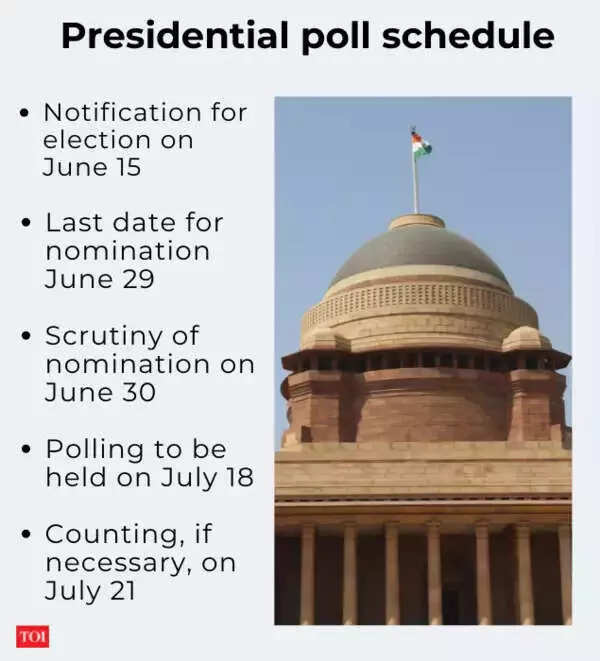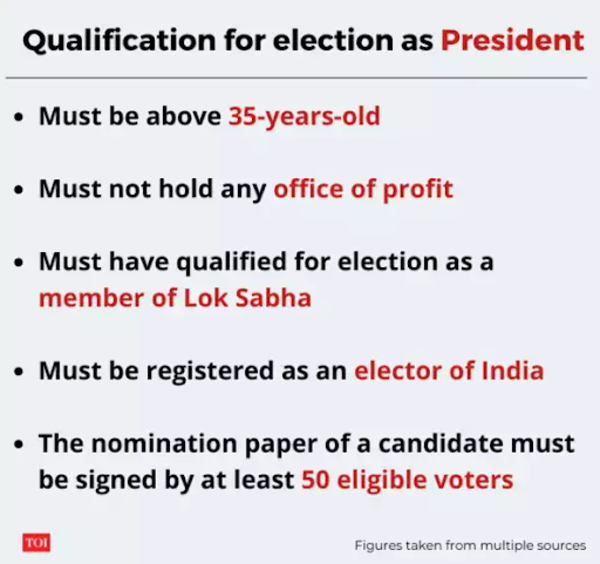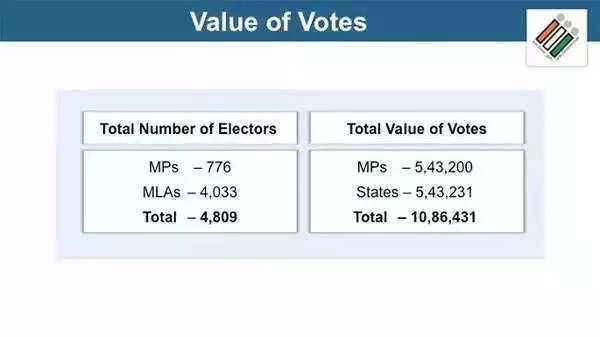NEW DELHI: Voting for the
Presidential election
will be held on Monday in the Parliament, the first day of the
Monsoon Session
.
Droupadi Murmu
is the BJP-led NDA candidate, who is contesting against Yashwant Sinha, supported by the opposition parties. The voting will begin at 10am and culminate at 5pm.
The polling will take place in Parliament House and state legislative assemblies for which ballot boxes have already reached their destinations.

A total of 776 MPs and 4,033 MLAs will vote in the Presidential elections. The Rajya Sabha’s secretary general is the Returning Officer for the election.
The counting of votes will take place at Parliament House on July 21 and the next President will take oath on July 25. The term of President
Ram Nath Kovind
concludes on July 24.
NDA candidate Droupadi Murmu has a clear edge over joint opposition candidate Yashwant Sinha as over 60 per cent votes are expected to be cast in her favour.
Murmu clear favourite
With the support of regional parties such as BJD, YSRCP, BSP, AIADMK, TDP, JD(S), Shiromani Akali Dal, Shiv Sena and now JMM, Murmu’s vote share is likely to reach nearly two-thirds and she is set to become the first woman from the tribal community to occupy the top constitutional post.
The National Democratic Alliance (NDA) nominee now has over 6.67 lakh votes after the support of various regional parties, out of a total of 10,86,431 votes.
A relatively unknown name in national politics, Murmu was a minister in the Odisha government between March 2000 and May 2004 during the BJP-BJD rule.
A Santhal tribal by birth, she was elected MLA from Odisha’s Rairangpur assembly constituency in 2000 and 2004 on a BJP ticket.
She was appointed the first woman governor of Jharkhand in May 2015, and remained in the post for over six years.
If Murmu wins
Murmu’s victory will be marked by several firsts. She will be the first President born in Independent India.
Live updates: Parliament Monsoon Sesssion
At 64, Murmu will also be the youngest occupant of Rashtrapati Bhavan, besides being the first tribal leader to hold the country’s top office.
Opposition fumbles, then picks Sinha
Before naming Sinha, a former Union minister and a BJP leader, the opposition camp had approached Gopalkrishna Gandhi, grandson of Mahatma Gandhi and a former governor of West Bengal, NCP chief Sharad Pawar and National Conference leader Farooq Abdullah to contest the poll.
After their refusal to be part of the electoral battle, Sinha, then the Trinamool Congress vice president, was named as the Opposition’s candidate.
Sinha is being backed by the Congress, NCP, Trinamool Congress, Communist Party of India, Communist Party of India (Marxist), Akhilesh Yadav led-Samajwadi Party, National Conference, All India Majlis-e-Ittehadul Muslimeen (AIMIM), Rashtriya Janata Dal and All India United Democratic Front (AIUDF).
The Arvind Kejriwal-led Aam Aadmi Party (AAP) recently said it will also be backing Sinha’s candidacy.
On his part, Sinha has been very active in trying to get opposition parties and members to support his candidacy.
The former BJP leader has made fervent appeals to parliamentarians and legislators across the country to vote for him regardless of party affiliations to help “save the Constitution, democracy, secularism and India”.
“This election is your last chance to introduce much-needed course correction in the BJP,” he told lawmakers from the saffron party.
Sinha, who began his electoral campaign from Kerala on June 28, said he ended the same on July 16 with a visit to his home state of Jharkhand. During this period, he said he visited 13 state capitals – Thiruvananthapuram, Chennai, Raipur, Hyderabad, Bengaluru, Gandhinagar, Srinagar, Chandigarh, Jaipur, Guwahati, Bhopal, Patna and Ranchi, and addressed several press conferences and 50 interviews.
Opposition attacks Murmu
On the eve of
presidential poll
, Sinha attacked his NDA rival saying that if elected, Murmu would become a “silent, pliant and rubber-stamp Rashtrapati”.
RJD leader Tejashwi Yadav called Murmu a statue. “We do not want to install a statue inside the Rashtrapati Bhavan. Has anyone of you ever heard her (Murmu’s) voice? She has not even addressed a press conference since her name was announced. At least we have all heard from Yashwant Sinha and have an idea of what he stands for,” the former Bihar deputy CM said.
Electoral college
The electoral college which elects the President through the system of proportional representation comprises elected MPs and members of state legislative assemblies. Nominated MPs and MLAs, and members of legislative councils are not entitled to vote in this election.

The system of secret ballot is followed and parties cannot issue whip to their MPs and MLAs with regard to voting.
Value of a vote
The value of the vote of a member of Parliament has gone down to 700 from 708 in this presidential poll due to the absence of a legislative assembly in Jammu and Kashmir.

The value of vote of an MLA varies in different states. In Uttar Pradesh, the value of vote of each MLA stands at 208, followed by 176 in Jharkhand and Tamil Nadu. In Maharashtra, it is 175. In Sikkim, the value of vote per MLA is seven, while it is nine in Nagaland and eight in Mizoram.
Election procedure
The election of the President is held in accordance with the system of proportional representation by means of single transferable vote.
Every elector can mark as many preferences, as there are candidates contesting the election.
These preferences for the candidates are to be marked by the elector, by placing the figures 1, 2, 3, 4, 5 and so on, against the names of the candidates, in the order of preference, in the space provided in column 2 of the ballot paper.
This is the reason why electronic voting machines are not used in this as well as vice presidential, Rajya Sabha and legislative council polls. The EVMs are based on a technology where they work as aggregator of votes in direct elections such as the Lok Sabha and state assemblies.
According to Election Commission’s directions, while MPs will get a green-coloured ballot paper, the MLAs will get a pink ballot paper to cast vote. Separate colours help the returning officer ascertain the value of vote of each MLA and MP.
Seeking to maintain secrecy of voting, the EC has issued a specially designed pen with violet ink to enable voters mark their ballot papers in the presidential poll.
-With inputs from agencies
